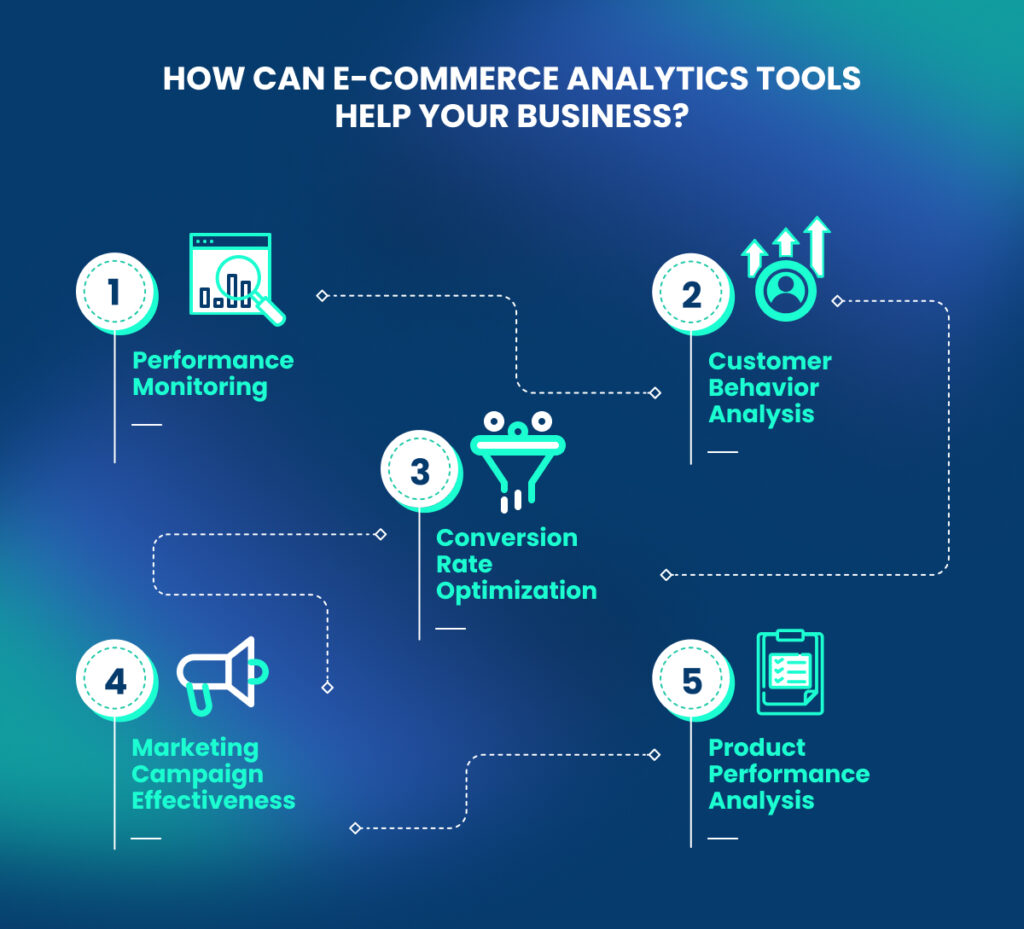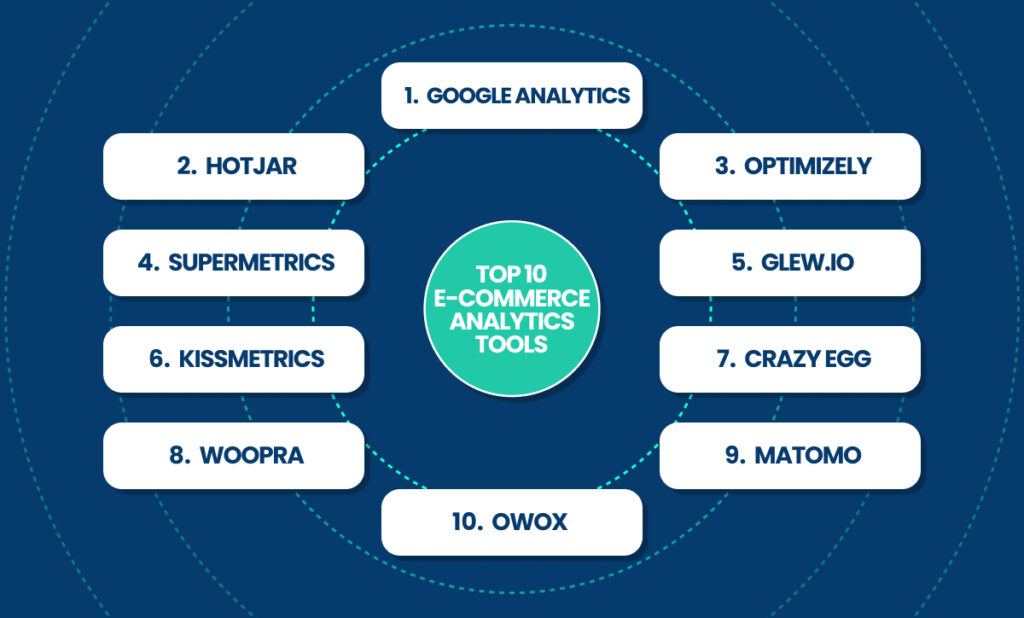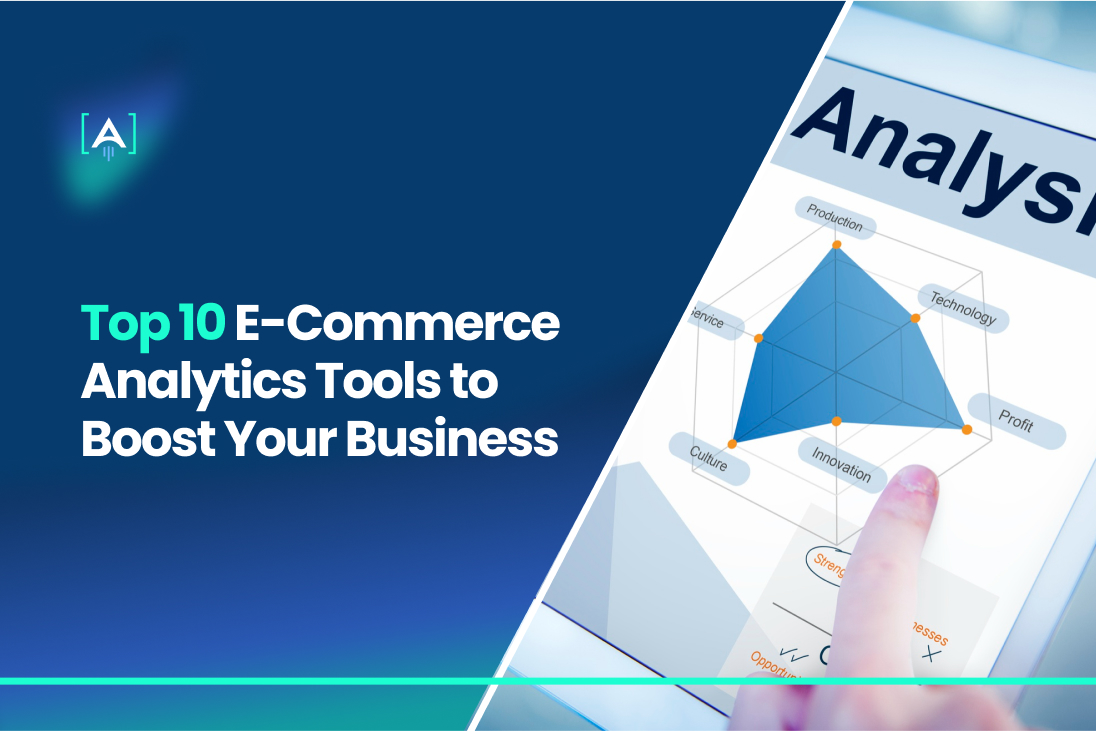Data is often considered the core of everything in the modern business landscape. With data, making informed decisions becomes possible.
Consider how important the role of data is in the e-commerce industry!
Yes, a lot!
In e-commerce, data collected from customer interactions, purchase history, and browsing behavior grants businesses to adapt their product recommendations, marketing messages, and promotional offers to individual choices.
Source: RegStag
This personalized method improves the shopping experience and boosts customer satisfaction, loyalty, and conversion rates.
Let’s discuss the industry’s importance of E-commerce analytics, its segments, and the key data analytics tools.
E-commerce Analytics for Business Growth
E-commerce analytics is the cornerstone of success in today’s thriving online marketplace. It systematically uses data and analytical tools to understand, track, and optimize online business performance.
Analytics encompasses collecting, analyzing, and interpreting data from various sources, such as website traffic, user behavior, and sales transactions, to gain insights into how customers interact with an e-commerce platform.

Critical segments in e-commerce analytics include customer acquisition, conversion rates, retention, and overall sales performance.
Utilizing e-commerce analytics software like Google Analytics, businesses can delve deep into metrics that reveal which marketing campaigns drive traffic and generate the most online sales.
Those tools provide a comprehensive view of customer journeys, helping businesses identify drop-off points and optimize their websites to enhance the user experience.
According to the latest research, social media’s influence continues to increase, and U.S. social commerce is projected to reach nearly $150 billion by 2029.
Source: RegStag
Online businesses rely heavily on these tools to measure their marketing campaigns‘ effectiveness and make data-driven decisions that boost sales and profitability.
By understanding customer demographics, purchasing patterns, and preferences, businesses can customize their products and marketing approaches to meet their target audience’s specific needs. Additionally, these tools enable companies to segment their customers, allowing for more personalized marketing efforts, which can guide to greater engagement and higher conversion rates.
E-commerce Marketing Agencies
E-commerce marketing agencies serve as strategic partners for online businesses, navigating the complexities of the e-commerce landscape.
They deeply understand customer behavior, marketing channels, and the best e-commerce analytics tools.
Moreover, they bring knowledge in setting up and managing e-commerce analytics software, ensuring businesses can track the right metrics and interpret the data accurately.
These agencies leverage this knowledge to design and execute data-driven marketing campaigns that drive traffic to online stores.
Through services like search engine optimization (SEO), social media marketing, and pay-per-click (PPC) advertising, they increase brand awareness, attract qualified leads, and ultimately convert those leads into paying customers.
Furthermore, e-commerce marketing agencies utilize analytics tools to measure the effectiveness of campaigns.
They track key metrics like website traffic, conversion rates, and customer acquisition costs, allowing them to refine strategies and enhance return on investment (ROI) for e-commerce companies.
In essence, e-commerce marketing agencies act as an extension of an online store’s marketing team, providing the knowledge and resources required to succeed in the competitive world of e-commerce.
Top 10 E-Commerce Analytics Tools

1. Google Analytics Insights
Google Analytics is a free e-commerce analytics tool for businesses of all sizes. Of course, you can find other e-commerce analytics software, but it is one of the best. It empowers online retailers to understand their customer journey at every touchpoint.
Source: Google Analytics
As a leading e-commerce analytics tool, it provides comprehensive insights into the customer journey and helps businesses optimize their marketing strategies.
Features:
- Real-Time Data Tracking: Monitor website activity as it happens, providing instant insights into visitor behavior.
- Detailed Traffic Reports: Analyze where your traffic is coming from, whether it’s search engines, social media, or direct visits.
- User Behavior Analysis: Understand how visitors deal with your site, including page views, session duration, and bounce rates.
- Conversion Tracking: Track specific goals, such as sales or sign-ups, to measure the effectiveness of your marketing campaigns.
- Audience Segmentation: Segment your audience according to demographics, location, and behavior for targeted marketing efforts.
- Integration with Google Services: Seamlessly integrate with Google Ads and Google Search Console for a holistic view of your online performance.
2. Hotjar for E-commerce
Hotjar stands out among e-commerce analytics tools by offering a visual approach to understanding customer behavior within your online store.
Source: Hotjar
It goes beyond raw data, providing features that clearly show how visitors interact with your website.
- Features:
- Heatmaps: Reveal click behavior and areas of high user interest
- Session recordings: View actual user journeys, identifying pain points and areas for improvement
- Conversion funnels: Track visitor progress through the checkout process and pinpoint drop-off points
- Polls & Surveys: Gather direct feedback from website visitors to understand their needs and preferences
3. Optimizely
E-commerce analytics tools are different. Optimizely is a leading data tool and one of the best e-commerce analytics tools designed to enhance the performance of e-commerce companies.
Source: Optimizely
It provides a robust A/B testing and personalization platform, helping businesses improve user experiences and boost retail e-commerce sales.
Features:
- A/B Testing: Conduct experiments by testing different versions of web pages and elements to determine which performs best, helping to optimize conversion rates.
- Personalization: Deliver tailored experiences to users based on their behavior, preferences, and demographics, increasing engagement and sales.
- Multivariate Testing: Test multiple variables simultaneously to understand the influence of various combinations on user behavior.
- Real-Time Analytics: Access immediate data on user interactions and test results, enabling quick decision-making and iterative improvements.
- Visual Editor: Use a user-friendly interface to create and modify tests without requiring coding knowledge, making it accessible to marketers and non-technical users.
- Integration: Seamlessly include with other tools and platforms, such as Google Analytics and various CRM systems, to comprehensively view performance metrics.
4. Supermetrics
Supermetrics is one of the top e-commerce analytics tools that streamlines data collection from various marketing platforms into a single location, such as Google Sheets, Excel, or a data warehouse.
It is highly valued in electronic commerce for its ability to simplify data integration and reporting.
Source: Supermetrics
Features:
- Data Integration: It connects with over 50 data sources, including Google Analytics, Facebook Ads, and HubSpot, aggregating all marketing data in one place.
- Customizable Reports: Allows users to create tailored reports and dashboards, facilitating better data visualization and decision-making.
- Automated Data Refresh: Automates data retrieval and updates, ensuring real-time data is always available for analysis.
- Ease of Use: Its user-friendly interface requires no coding skills, making it accessible for marketers and business owners.
5. Glew.io
Source: Glew.io
Glew.io is a customer analytics platform that provides e-commerce businesses with comprehensive insights into sales, customer behavior, and marketing performance.
It is especially beneficial for enhancing customer engagement and optimizing business strategies.
Features:
- Detailed Analytics: Offers in-depth reports on sales, products, customers, and marketing channels, helping businesses to make informed decisions.
- Customer Segmentation: This technology enables businesses to segment their customers based on behavior, demographics, and purchase history for targeted marketing.
- Integration Capabilities: Integrates with popular e-commerce platforms like Shopify, Magento, and WooCommerce, as well as various marketing tools.
- Profitability Analysis: Suggests insights into the profitability of products and customer segments, aiding in resource allocation.
6. Kissmetrics
Kissmetrics is a web analytics tool that tracks individual user behavior and provides insights into customer engagement and retention.
It helps e-commerce businesses analyze customer behavior and optimize their marketing efforts.
Source: Kissmetrics
Features:
- User Tracking: Tracks individual user actions across sessions and devices, providing a complete view of the customer journey.
- Behavioral Analytics: Offers detailed reports on user behavior, helping businesses understand how customers deal with their website.
- Segmentation and Cohort Analysis: Allows businesses to segment users and analyze retention over time, identifying trends and opportunities for growth.
- A/B Testing: Facilitates A/B testing of different elements on the website to determine what drives the best results.
7. Crazy Egg
Crazy Egg is a web analytics tool that offers heatmaps and A/B testing to help e-commerce businesses understand user behavior and improve website performance.
Source: Crazy Egg
Features:
- Heatmaps: Visualize where users click, scroll, and hover on your website, highlighting popular areas and potential issues.
- Session Recordings: Record user sessions to see how visitors interact with your site in real time.
- A/B Testing: Test various versions of web pages to find out which performs best in terms of user engagement and conversions.
- Easy Integration: Simple to set up and integrates easily with other web analytics and marketing tools.
8. Woopra
Woopra is an end-to-end customer journey analytics platform designed to help e-commerce businesses understand and optimize every touchpoint in the customer lifecycle.
Features:
- Customer Journey Mapping: Provides a detailed map of the customer journey across multiple touchpoints, from first interaction to purchase and beyond.
- Real-Time Analytics: Offers real-time insights into user behavior and engagement, helping businesses make timely decisions.
- User Profiles: Creates detailed user profiles that aggregate data from various sources, offering a comprehensive view of each customer.
- Segmentation and Retention: Allows businesses to segment users based on behavior and analyze retention metrics to improve customer loyalty.
Source: Woopra
9. Matomo
Matomo (formerly Piwik) is an open-source web analytics tool that provides robust analytics capabilities while prioritizing data privacy and ownership.
Source: Matomo
Features:
- Comprehensive Analytics: This service offers various analytics features, including visitor tracking, goal setting, and e-commerce reporting.
- Data Privacy: Ensures full data ownership and compliance with privacy regulations like GDPR, making it a preferred choice for privacy-conscious businesses.
- Customizable: Highly customizable with a wide range of plugins and integrations to suit various business needs.
- On-Premise Option: Offers cloud-hosted and on-premise solutions, providing data storage and management flexibility.
10. OWOX
OWOX is a cloud-based marketing analytics tool that includes data from various sources, providing a comprehensive view of marketing performance for e-commerce businesses.
Source: OWOX
Features:
- Data Integration: Consolidates data from multiple sources, including Google Analytics, CRM systems, and advertising platforms, into a single dashboard.
- Custom Reports: Allows businesses to create custom reports and dashboards tailored to their needs.
- Attribution Modeling: Provides advanced attribution modeling to help businesses understand the impact of different marketing channels on conversions.
- Real-Time Analytics: Offers real-time insights into marketing performance, enabling businesses to make quick, informed decisions.
Partner with [A] Growth Agency for Your E-commerce Industry
[A] Growth Agency for your e-commerce industry is what you need! Our top-tier analytics tools and expert growth marketing strategies will leverage the success of your business.
We understand that every e-commerce business is unique.
So, we suggest personalized growth marketing solutions that cater to your specific needs.
Our expertise in e-commerce ensures that you clearly understand your customer journey and the performance of your marketing campaigns.
Partner with us and start your success journey!

